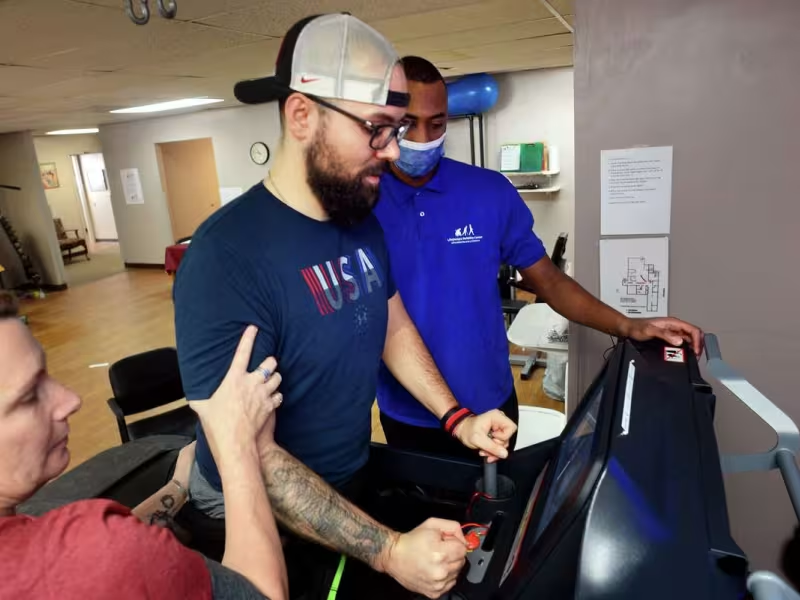
SHELTON — A Shelton nonprofit rehabilitation center has managed to not only survive, but thrive in the face of the COVID-19 pandemic.
Moving with Hope — long known for providing affordable care to those diagnosed with debilitating physical disabilities — received about $600,000 in COVID relief funds. Owners Tad and Joanne Duni invested the federal money in state-of-the-art equipment and hiring experienced staff for the 10-year-old center.
“I thought we would never get this chance again, so we went for it,” said Tad Duni, who hosted U.S Rep. Jim Himes last week for a tour of the facility, now located on Controls Drive.
“We invested the money to further develop our real-world working public health model to help people living with disabilities and COVID-long-haulers regain health, skills and independence,” Duni said. “We’ve made Moving with Hope the best-equipped outpatient clinic in Connecticut.”
Duni added the facility’s “cupboard is full. Now we just need to let everyone know what we offer.”
When insurance-based services stop short, Duni said, Moving with Hope focuses on continuing the client’s journey to recovery. Duni said the organization’s clients receive more than six hours of rehab and other support strategies each week. Pricing is about $55 per hour, he said.
In the year prior to the pandemic — which forced shutdowns and limited services — the Dunis’ team of eight full-time and five part-time employees provided more than 24,000 hours of direct client services.
Moving With Hope has since expanded its services to include skilled occupational therapy, physical therapy and speech language pathology. The additional services will complete the Dunis’ community-based model goal of providing the best opportunity for people seeking optimal recovery, health, wellness and independence, he said.
“Moving with Hope provides life changing rehabilitative services to those who are recovering from a serious injury,” Himes said. “I got to see that work up close. Best of all, I saw how the federal government has supported the critical mission of their team during this pandemic.”
Himes noted that $350,000 in state-of-the-art equipment and $80,000 in additional staffing and training were both made possible by the CARES Act.
“Thanks to Tad and his colleagues for showing me how they’ve put this money to good use,” Himes added.
Duni also used the relief funds to purchase equipment, such as the Madonna intelligently controlled assistive rehabilitation elliptical (ICARE) trainer, which helps physically challenged individuals and those with chronic conditions regain or retain their walking ability and levels of physical fitness.
Also, among the 25 new pieces of equipment is the AlterG anti-gravity treadmill, which uses air to unweight patients, enabling greater comfort and mobility without impeding natural gait mechanics.
Duni said the AlterG® integrates patented, NASA differential air pressure (DAP) technology, a precise air calibration system, and real-time information in rehab and training. Duni said AlterG enables patients to move unrestricted and pain-free — restoring and building muscle strength, range of motion, balance, function, and fitness.
“There are only a handful of these in the state,” Duni said.
Moving with Hope also offers a virtual reality physical therapy occupational system, Duni says, which is the only one of its kind in the country.
Duni said the technology is in place, along with the quality staff, in what is a model for similar facilities throughout the state and country.
“We need a public health plan in place that addresses the restoration of physical health for the current COVID-long-haulers, the next COVID-19 survivors and for the millions of aging Americans with poor health, disabilities, and poor savings,” Duni said.
Duni said the process can begin with a partial solution — the establishment of dozens of “re-ability clinics” in every state.
“The model does not rely on health insurance to pay for services,” Duni said. “Reability clinics only provide activity-based therapy, using evidenced-based science to implement appropriate mass practice and task specificity.
Duni said, with an aging population, there was a need for up to 20,000 such facilities in the U.S. in the next 10 years.
“There is no system like this anywhere in the country, but there are millions of people in need of what we offer,” he said.
brian.gioiele@hearstmediact.com
MOST POPULAR
- ‘This definitely hurts’: UConn women’s basketball nearly turns complicated season into national title
- UConn women’s basketball coach Geno Auriemma has strong words about the transfer portal
- Highlights: UConn women's basketball loses to South Carolina in NCAA championship game
- What went wrong for the UConn women’s basketball team against South Carolina?
- UConn recruited Aliyah Boston. Now the South Carolina star is standing between the Huskies and an NCAA title
- UConn women’s basketball falls to South Carolina: ‘At UConn, it’s national championship or nothing’
- Feds: Kilograms of cocaine, fentanyl, marijuana shipped to CT
Curious about cannabis in CT? Check out our free newsletter series
Click here to sign up for our free, seven-day newsletter course on legal cannabis in Connecticut.
Written By